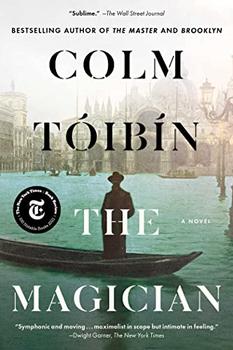Book Club Discussion Questions
In a book club? Subscribe to our Book Club Newsletter!
Please be aware that this discussion guide will contain spoilers!
- From an early age, Thomas is very much in the public eye of Lübeck. How do you think this affects his emotional development?
- On page 23, Thomas reflects "No matter where he went, he would never be important again." What do you make of that amount of self-awareness from one so young?
- On page 72, Thomas meets Klaus and Katia for the first time. How is their relationship as siblings different from the relationships that Thomas has with his? And what draws him to them?
- Almost immediately after his sudden intimacy with Herr Huhnemann (pg. 75), Thomas decides to propose to Katia. Why do you think he made this decision?
- On page 107, Mann reflects that he "realized that after his sister's death he had busied himself with writing. Sometimes he even managed to believe that her suicide had not even happened." What do you make of this detachment from grieving? How is it similar to (or different from) the way Thomas handled the death of his father?
- On page 177, Katharina Schweighardt, the landlady who cares for Julia Mann, says, "No one who has been used to money can live with that. That is how the world is." How do you see this reflected in other members of the Mann family?
- Tóibín describes a profound union between Katia and Thomas. They have an unspoken agreement about his sexuality and how it plays out in their marriage. Why do you think Katia accepts this this arrangement? How do you read her wants and desires as a character?
- On pages 209–10, Thomas reflects that "His two eldest children, he understood, could not be damaged as he could be. Their standing in the world depended on their open dismissal of easy sexual categories. Any effort to undermine their reputation would be banished by their own careless laughter and that of their friends. But no one would be amused if sections of his diary were to be published." Discuss why Thomas is afraid. What do you make of Thomas's sexualization of younger boys (including his own son)?
- Throughout the beginning of Hitler's rise to power, Thomas struggles with his place in the public eye. What are his reasons for not immediately denouncing Hitler, and do you think they are selfish? Misguided? Why or why not?
- On page 276, Thomas says in reference to his writing, "I can make no sense of the present. It is all confusion. I know nothing about the future." How do you think this applies to his approach to life in general, and specifically to his writing up to this point in the novel?
- The chapter on page 445 opens with the statement: "The war was over; Thomas had not experienced it. He did not know what its aftermath meant." As Thomas experiences Germany after the war, how does this play out?
- After Thomas refuses to attend Klaus's funeral, he receives a letter from Michael, which admonishes him for not being more present to his own children, while always seeking his success as a writer first. What impact do you think this letter has on Thomas?
- At the end of The Magician, reflect on what you think Thomas's main motivations in life are. Could he have been successful in pursuing these without women like Katia and Erika?
- Once you've finished The Magician, do some group research on the historical Thomas Mann. What aspects of the novel seem to be direct corollaries to his life, and which things may be of the author's imagination?
Enhance Your Book Club
Supplemental reading:
The Magic Mountain by Thomas Mann
Buddenbrooks: The Decline of a Family by Thomas Mann (Tóibín recommends the translations by John E. Woods or John Edwards.)
Thomas Mann: Eros and Literature by Anthony Heilbut
Death in Venice by Thomas Mann
Supplemental viewing:
Jojo Rabbit
Katja Mann: A Life with Thomas Mann
Death in Venice
Unless otherwise stated, this discussion guide is reprinted with the permission of Scribner.
Any page references refer to a USA edition of the book, usually the trade paperback version, and may vary in other editions.
